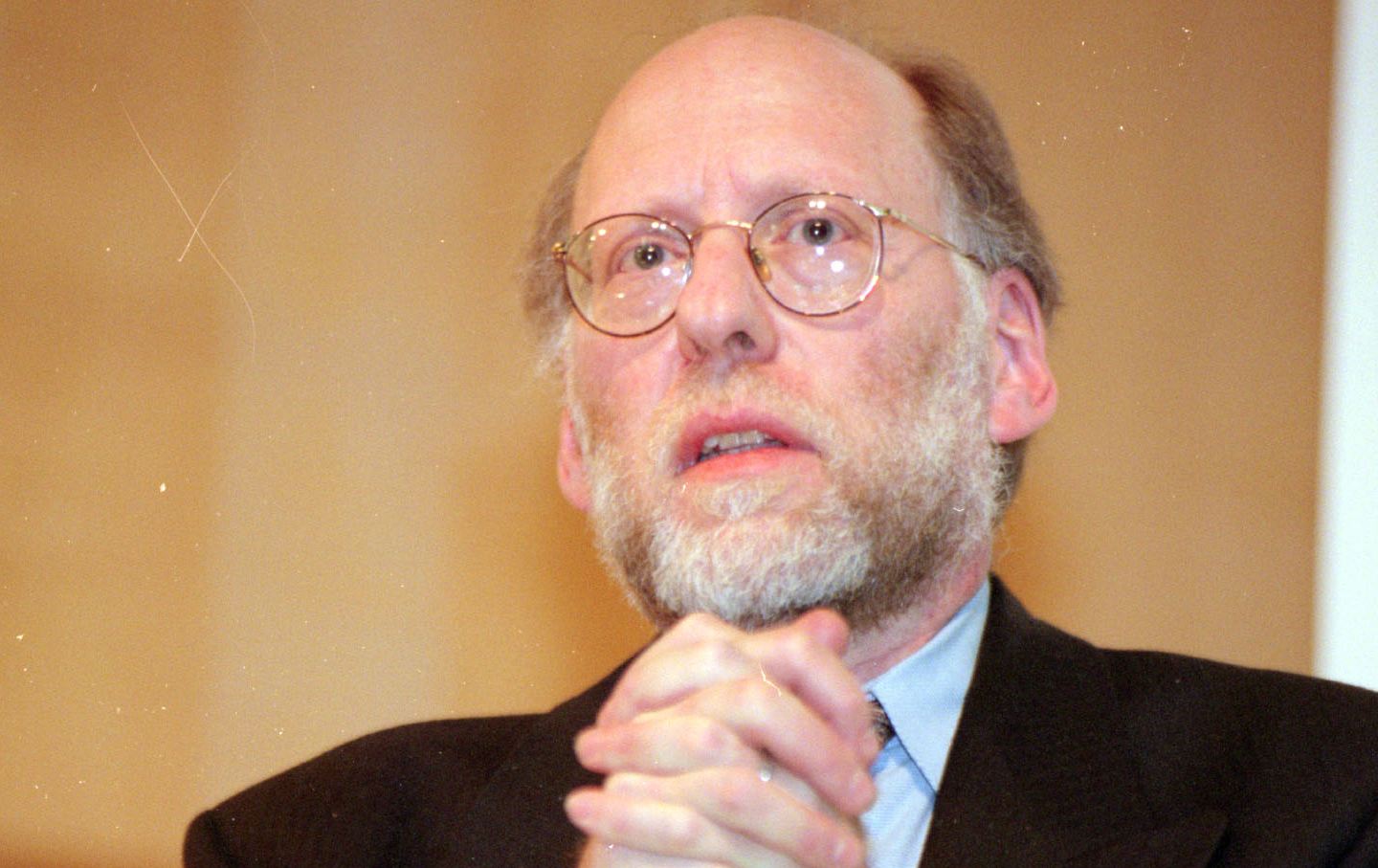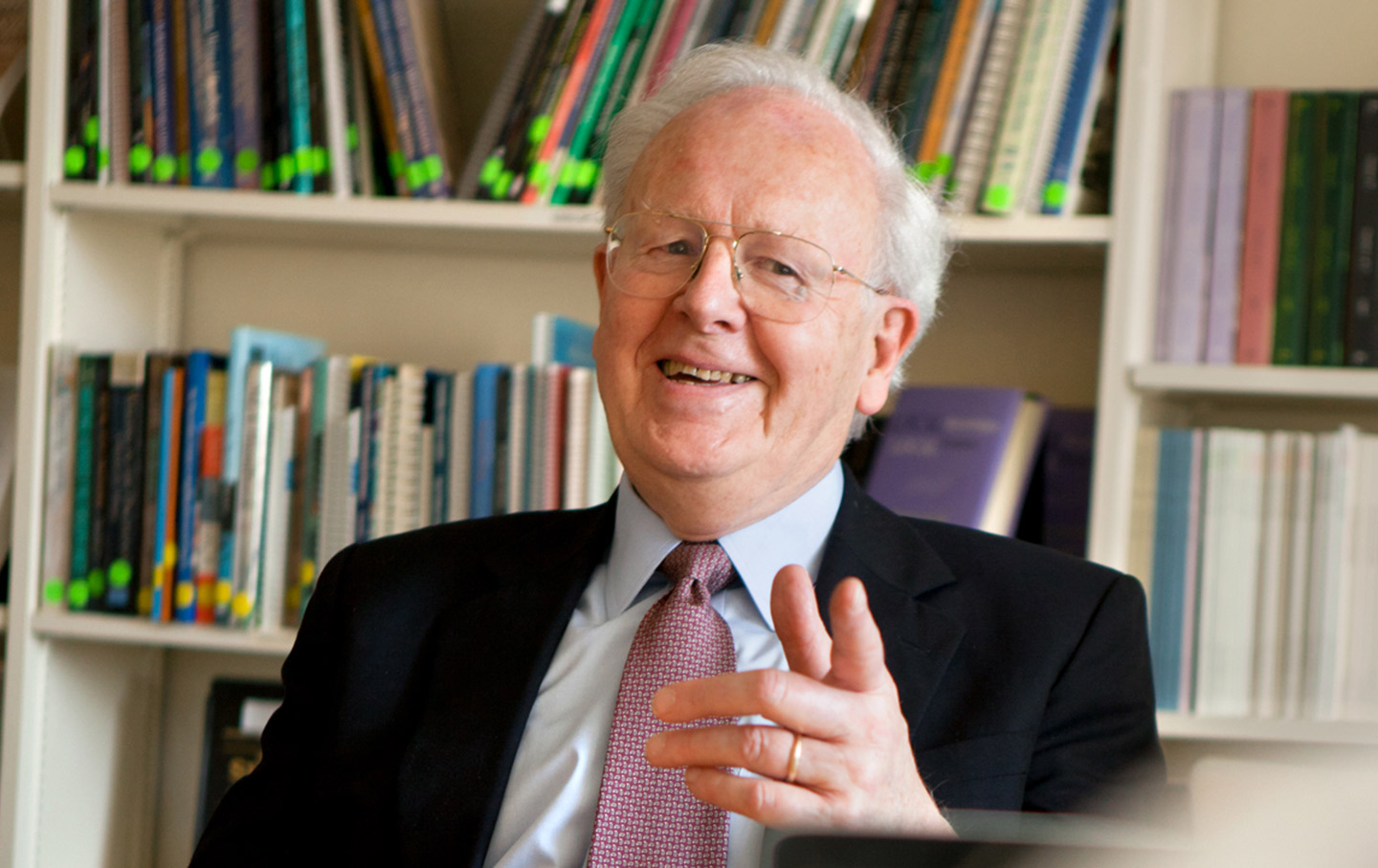Elliott Abrams: Convicted Liar, Defender of Dictators, Accomplice to Genocide—and Foreign Policy Wise Man
A career nearly as steeped in blood as Henry Kissinger’s hasn’t prevented the establishment from embracing—and whitewashing—this serial slanderer.

The name “Elliott Abrams” has been popping up a great deal of late in the news coverage of Israel’s war in Gaza. This should come as no surprise, as Abrams is an eager source for mainstream media journalists and a reliable defender of everything Israel does. When quoted, reporters tend to describe him as a “veteran American conservative” (The New York Times), a “Middle East specialist” (The New York Times), a “deputy national security adviser under Bush” (The Washington Post), or “a senior fellow at the Council on Foreign Relations” (The Washington Post).
These descriptions are not untrue, but they miss the point. The proper ID for Elliott Abrams should read: “The US official under Ronald Reagan who engendered what a UN Truth Commission specifically termed ‘genocide’ in Guatemala, defended mass murder in El Salvador, lied repeatedly to Congress about his role in the Iran-Contra scandal, and having returned to government under George W. Bush after having been pardoned for his crimes by George H.W. Bush, proceeded to also undermine democracy among the Palestinians and to empower Hamas.”
Abrams is the US foreign policy’s living, breathing Heart of Darkness. That he is treated as the equivalent of an old-fashioned “wise man” in the mainstream media and has made himself a mainstay in the most influential foreign policy think tank (the Council on Foreign Relations) provides incontrovertible evidence of the long-standing moral rot at the center of US foreign policy politics—a rot that long preceded the ascent of Donald Trump and his MAGA minions.
Before Ronald Reagan appointed Abrams to be his assistant secretary of state for human rights and humanitarian affairs, he was best known for being Norman Podhoretz’s ambitious son-in-law. The neocon network got him hired by both Pat Moynihan and Henry “Scoop” Jackson as a Senate staffer. With Reagan’s election, he ascended to the State Department in 1982 just a the US-funded Salvadoran military and its associated death squads were ravaging that country, committing an estimated 85 percent of the 22,000 investigated examples of murder, torture and disappearance compiled by the UN-sponsored Truth Commission, whose report was released 12 years after the end of El Salvador’s civil war. (The Farabundo Marti National Liberation Front [FMLN] guerrillas were deemed responsible for the remainder.) In one particularly gruesome—but all too representative—example, the US-trained Atlacatl Battalion military conducted a massacre of hundreds of civilians in an area thought to be sympathetic to the rebels, murdering more than 500 people in six villages.
In just one of those villages, El Mozote, 200 people were killed, the men were tortured and executed, then the women were executed and, finally, the children, by soldiers spraying machine-gun fire into a tiny building where they were hiding. It was also during this period that the beloved Salvadoran Archbishop Oscar Romero, who was critical of the US-supported dictatorship, was murdered on orders of Salvadoran Maj. Roberto d’Aubuisson.
Brave journalists and human rights workers risked their lives to get the truth of these crimes to the US public. But when asked about these events in Congress, Abrams repeatedly lied about what the US knew about these events and attacked the reputations of those who tried to tell the truth. Regarding El Mozote, Abrams told a Senate committee that the press reports were not “credible” and that “it appears to be an incident that is at least being significantly misused, at the very best, by the guerrillas.”
As for d’Aubuisson, Abrams insisted, “Anybody who thinks you’re going to find a cable that says that Roberto d’Aubuisson murdered the archbishop is a fool.” In fact the truth commission discovered two such (later) declassified cables. He has since claimed that “the administration’s record in El Salvador is one of fabulous achievement,” and attacks on it are “a post-Cold War effort to rewrite history.”
Even more egregious, if possible, was Abrams’s role regarding Guatemala. Gen. Efraín Ríos Montt executed a coup there in 1982 with US support as the country’s military forces engaged in crimes against humanity—including genocide—against the indigenous people in the Ixil region of the department of Quiché, according to the findings of a three-judge panel appointed by the UN. At the time, as the State Department’s top human rights official, Abrams credited the dictator with having “brought considerable progress” on human rights issues and insisted that “the amount of killing of innocent civilians is being reduced step by step.” He demanded that Congress provide Ríos Montt’s regime with advanced arms because its alleged “progress need[ed] to be rewarded and encouraged.”
Promoted to assistant secretary of state for inter-American affairs in 1985, Abrams repeatedly denounced the continued protests from Democrats and human rights activists about the carnage in Guatemala. When The New York Times published an op-ed challenging the official State Department account of one set of the mass murders underway—by a woman who had witnessed a death-squad assassination in broad daylight in Guatemala City that had never been mentioned in the press—Abrams responded by lying outright. In a letter to the editor, he cited an imaginary story in a nonexistent newspaper to insist that the man’s murder had, in fact, been reported.
At the end of the Reagan administration, when it became obvious that he had consistently lied to Congress multiple times about many events, including especially his deep involvement in the Iran-Contra affair, he plea-bargained his crimes with special counsel Lawrence Walsh down to two misdemeanor counts of withholding information from Congress about secret efforts to provide illegal aid to the contras in Nicaragua. As a result of his conviction, Abrams was put on probation for two years and ordered to devote 100 hours to community service before being pardoned. The District Bar Board on Professional Responsibility recommended that he be suspended from the practice of law in the District of Columbia for a period of one year.
Yet today Abrams is successfully selling himself to the media as a Middle East expert, where, once again, he is either minimizing or defending mass murder. In a Council on Foreign Relations blog post picked up by The New York Times, he insisted that widely accepted numbers of Palestinian casualties in Gaza are nothing more than “Hamas propaganda.” He has also shared myriad op-eds in conservative publications like The Wall Street Journal, National Review, Tablet, and Fathom. (Abrams is also chairman of the board of the far-right Jewish foundation Tikvah, which publishes the right-wing Jewish website Mosaic, where his opinions also frequently appear.) To give a flavor of these, in a recent attack in Fathom on Jews who did not support Israel’s war in Gaza, he began by claiming, “Most American Jews have watched with disgust as the United Nations system—the General Assembly, the International Court of Justice, the International Criminal Court—attacks the State of Israel week after week,” though nowhere in the piece did he even attempt to provide any evidence for this act of pure projection.
In fact, Abrams’s only experience as an official with responsibility in the Middle East in George W. Bush’s National Security Council was almost as disastrous as his role in Central America. After pushing for Palestinian elections in 2006 and seeing Hamas win them, the United States supported a plan to try to overturn the verdict by backing an attack by the losers (Fatah) on Hamas. It backfired, of course, and led to the Hamas takeover of Gaza, and eventually to the October 7 massacre and the horrific war now underway by Israel against the Palestinians. It was also the last time the Palestinians, either in the West Bank or Gaza, have been permitted to participate in an election.
Popular
“swipe left below to view more authors”Swipe →And yet when Trump’s first secretary of state, Rex Tillerson, was trying to get Abrams named as his deputy, the mainstream media, together with the foreign affairs establishment, again treated him as a voice of relative sanity and restraint. The New York Times, for instance, quoted Dennis Ross, a pro-Israel adviser to many presidents, including Barack Obama, explaining: “For the most part, I think he would be welcomed in the State Department.… He’s seen as serious, responsible and knowledgeable.” Another Times piece on these efforts, which turned out to be unsuccessful because Abrams had apparently hurt Trump’s feelings during the 2016 Republican primary process, described him merely as a “seasoned Republican foreign policy official.”
Nowhere, perhaps in all American politics has the truth of George Orwell’s observation, “Political language is designed to make lies sound truthful and murder respectable, and to give an appearance of solidity to pure wind,” been better illustrated than in the four-plus decades of Elliott Abrams’s career. Over the course of his ruinous résumé, Abrams has amassed a series of job titles that, second perhaps only to Henry Kissinger, he is the person on Earth least qualified to hold. Beginning with the State Department Human Rights and Humanitarian Affairs job, he has also been president of the misnamed Ethics and Public Policy Center, and a board member of the National Endowment for Democracy. His job title under George W. Bush was “deputy national security adviser for global democracy strategy,” and, to his shame, Joe Biden recently appointed him to be a member of the US bipartisan United States Advisory Commission on Public Diplomacy. Just last Tuesday, June 11, the Council on Foreign Relations invited its members to hear Abrams’s wisdom, as part of its “Roundtable Series on Democracy Promotion and Human Rights” (no irony apparently intended).
It should be all but impossible for journalists to claim ignorance of Abrams’s past crimes and misdemeanors. I have written about him more times than I can count, beginning with a long profile in the Washington Monthly back in 1987. Because he has so frequently been appointed to senior positions both in and out of government, various progressive outlets have also published pieces detailing his various crimes and misdemeanors. Occasional reports have also appeared in these same MSM outlets.
How is it that so many mainstream reporters, editors, and think-tank boards continue to treat him as a respected and responsible voice of pre-Trump conservative foreign policy expertise? The answer, unfortunately, is simple but unavoidable: He takes their calls. He gives good quotes. And he once criticized Donald Trump. Sure, there’s the lying, the repeated policy failures, the mass murders—even the genocide stuff—but they just don’t care. They never have.









